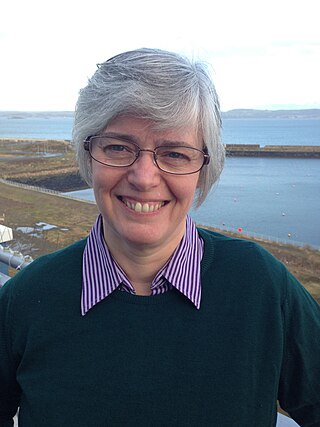
The Royal Society of Chemistry (RSC) is a learned society and professional association in the United Kingdom with the goal of "advancing the chemical sciences". It was formed in 1980 from the amalgamation of the Chemical Society, the Royal Institute of Chemistry, the Faraday Society, and the Society for Analytical Chemistry with a new Royal Charter and the dual role of learned society and professional body. At its inception, the Society had a combined membership of 49,000 in the world.
The Corday–Morgan Medal and Prize is awarded by the Royal Society of Chemistry for the most meritorious contributions to experimental chemistry, including computer simulation. The prize was established by chemist Gilbert Morgan, who named it after his father Thomas Morgan and his mother Mary-Louise Corday. From the award's inception in 1949 until 1980 it was awarded by the Chemical Society. Up to three prizes are awarded annually.

Sir Anthony Kevin Cheetham is a British materials scientist. From 2012 to 2017 he was Vice-President and Treasurer of the Royal Society.

Sir Christopher Martin Dobson was a British chemist, who was the John Humphrey Plummer Professor of Chemical and Structural Biology in the Department of Chemistry at the University of Cambridge, and Master of St John's College, Cambridge.
Guy Charles Lloyd-Jones FRS FRSE is a British chemist. He is the Forbes Professor of Organic Chemistry at the University of Edinburgh in the United Kingdom. His research is largely concerned with the determination of organometallic reaction mechanisms, especially those of palladium-catalyzed coupling reactions such as Suzuki-Miyaura coupling.
Matthew Jonathan Rosseinsky is a British academic who is Professor of Inorganic Chemistry at the University of Liverpool. He was awarded the Hughes Medal in 2011 "for his influential discoveries in the synthetic chemistry of solid state electronic materials and novel microporous structures."
Stephen T. Liddle FRSE FRSC is a British professor of inorganic chemistry at the University of Manchester. He is Head of Inorganic Chemistry and Co-Director of the Centre for Radiochemistry Research at the University of Manchester since 2015.

Eleanor Elizabeth Bryce Campbell FRSE FRS FRSC FInstP is a Scottish scientist who holds the Chair of Chemistry at the University of Edinburgh.

Dame Clare Philomena Grey is Geoffrey Moorhouse Gibson Professor in the Department of Chemistry at the University of Cambridge and a Fellow of Pembroke College, Cambridge. Grey uses nuclear magnetic resonance spectroscopy to study and optimize batteries.

Polly Louise Arnold is a British chemist who is director of the chemical sciences division at Lawrence Berkeley National Laboratory and professor of chemistry at the University of California, Berkeley. She previously held the Crum Brown chair in the School of Chemistry, University of Edinburgh from 2007 to 2019 and an Engineering and Physical Sciences Research Council (EPSRC) career fellowship.

John Paul Attfield is a British chemist who is Professor of Materials science in the School of Chemistry at the University of Edinburgh and Director of the Centre for Science at Extreme Conditions (CSEC).
Stephen Mann, FRS, FRSC, is Professor of Chemistry, co-director of the Max Planck Bristol Centre for Minimal Biology, director of the Centre for Organized Matter Chemistry, director of the Centre for Protolife Research, and was principal of the Bristol Centre for Functional Nanomaterials at the University of Bristol, UK.

Eva Hevia is a Professor of Organometallic Chemistry at the University of Strathclyde, Glasgow and Professor at the Department of Chemistry and Biochemistry, the University of Bern.
Helen H. Fielding is a Professor of physical chemistry at University College London (UCL). She focuses on ultrafast transient spectroscopy of protein chromophores and molecules. She was the first woman to win the Royal Society of Chemistry (RSC) Harrison-Meldola Memorial Prize (1996) and Marlow Award (2001).
Rosalind Jane Allen is a soft matter physicist and Professor of Theoretical Microbial Ecology at the Biological Physics at the Friedrich-Schiller University of Jena, Germany, and (part-time) Professor of Biological Physics at the University of Edinburgh, Scotland She is a member of the centre for synthetic biology and systems biology where her research investigates the organisation of microbe populations.
Karen Jane Faulds is a Scottish academic and Professor of Analytical Chemistry at the University of Strathclyde. She develops surface-enhanced Raman spectroscopy (SERS) for bioanalysis, and has won several awards for her research, including the Coblentz Society Craver Award.
Silvia Paracchini FRSE is a Professor of Neurogenetics and Genomics at the University of St Andrews. Her research focuses on the genetics of neurodevelopmental traits such as dyslexia and human handedness.
Andrew L. GoodwinFRS is a university research professor and professor of materials chemistry at the University of Oxford.

Melinda Jane Duer is Professor of Biological and Biomedical Chemistry in the Department of Chemistry at the University of Cambridge, and was the first woman to be appointed to an academic position in the department. Her research investigates changes in molecular structure of the extracellular matrix in tissues in disease and during ageing. She serves as Deputy Warden of Robinson College, Cambridge. She is an editorial board member of the Journal of Magnetic Resonance.









